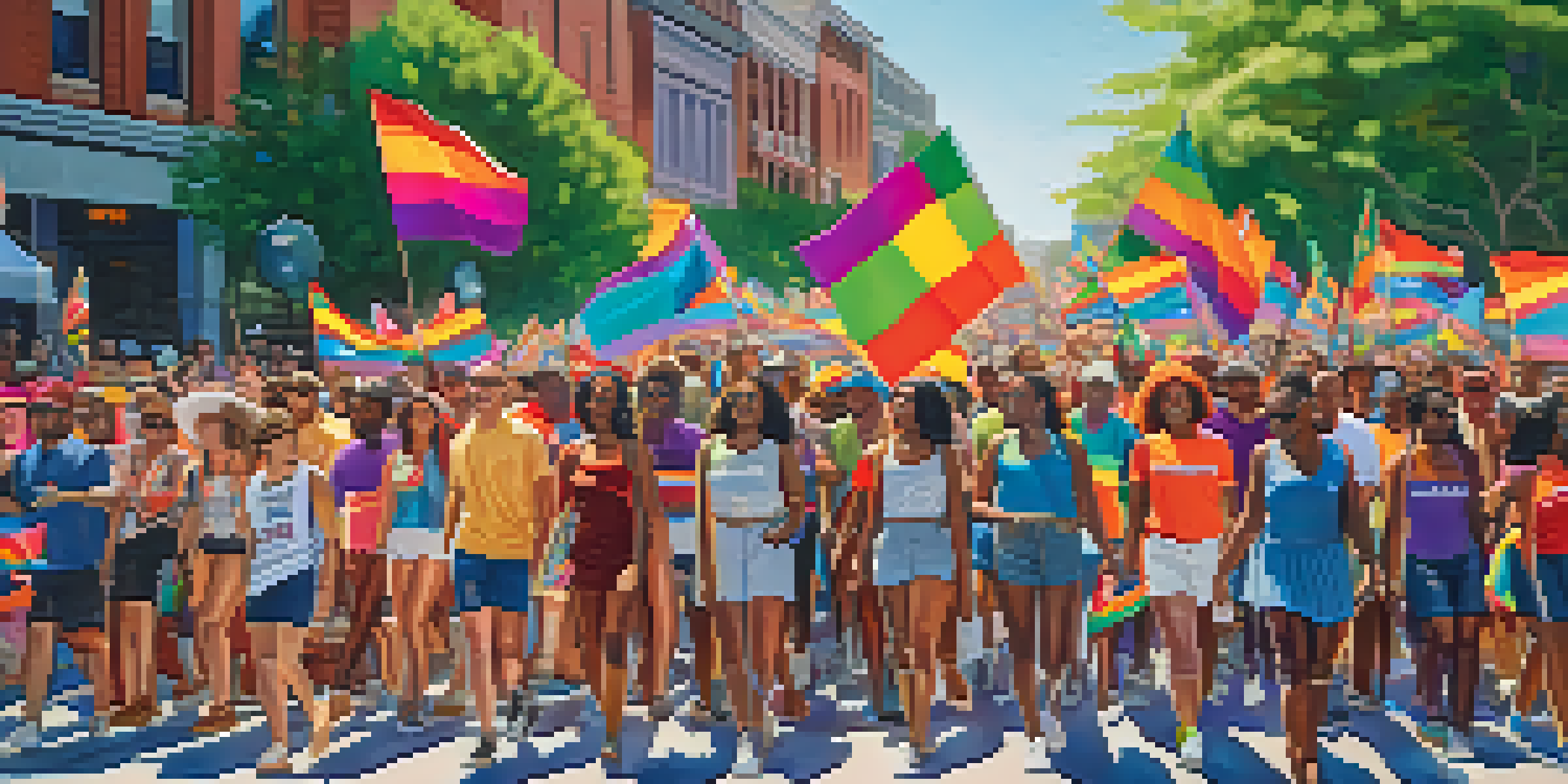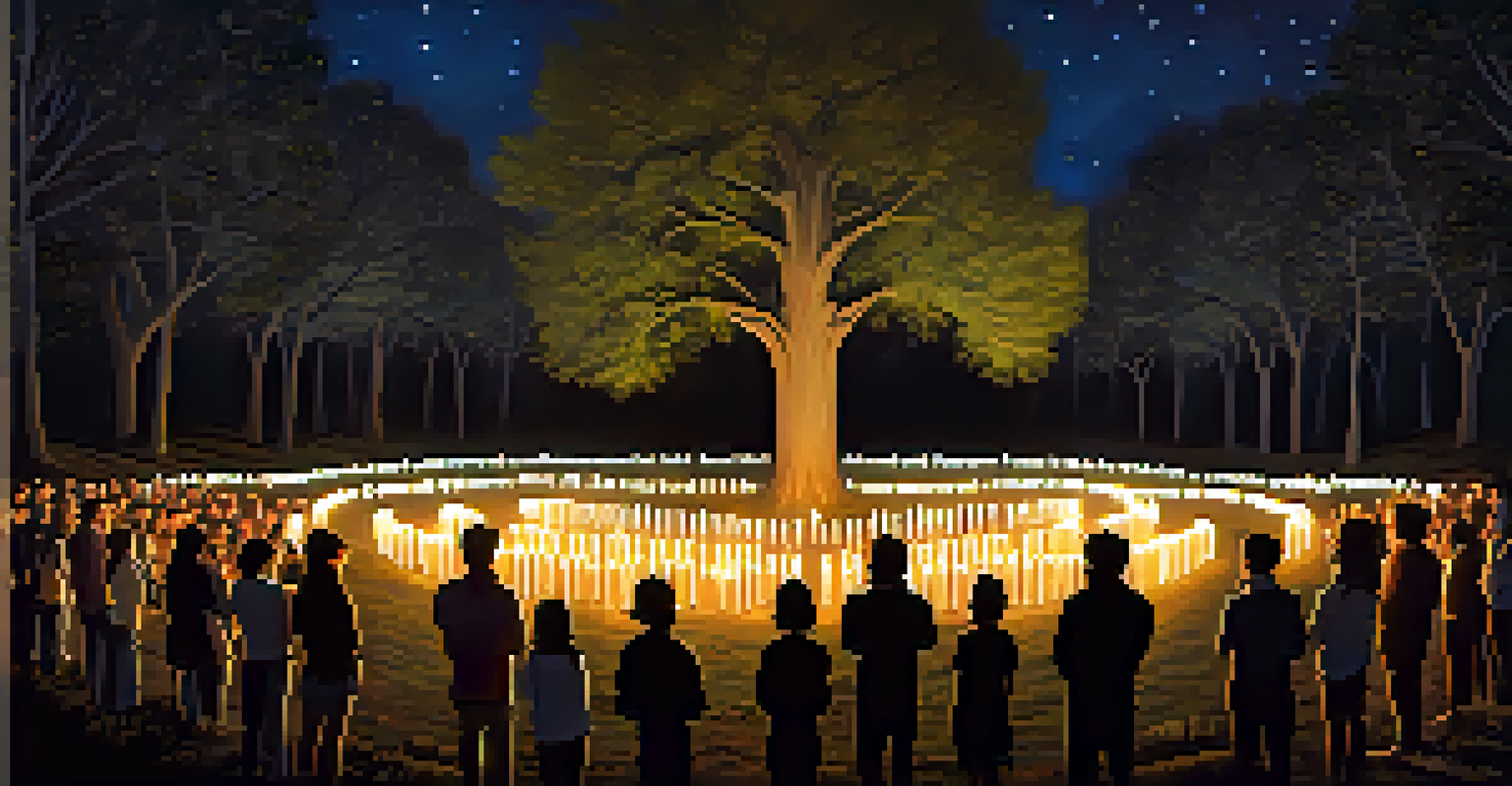Atlanta's LGBTQ+ Rights Movement: Milestones and Achievements

The Early Days: A Struggle for Acceptance in Atlanta
In the mid-20th century, Atlanta was a backdrop of societal challenges for LGBTQ+ individuals. The atmosphere was marked by discrimination and a lack of visibility, making it difficult for the community to find acceptance. Despite these challenges, small groups began to form, laying the groundwork for a more organized movement.
The only thing worse than being blind is having sight but no vision.
In 1971, the first gay pride march in Atlanta took place, a significant step that showcased the community's desire for recognition. This event was not just a parade; it represented hope and resilience against a backdrop of societal indifference. Participants marched openly, despite the risk of backlash, making their voices heard in a city that had long ignored their existence.
These early efforts set the stage for future activism, emphasizing the importance of visibility and community solidarity. The courage displayed during these formative years inspired subsequent generations to continue the fight for equality and pushed Atlanta's LGBTQ+ community into the national spotlight.
Formation of Key Organizations: Building Community Support
As the movement gained momentum, the establishment of organizations like the Atlanta Gay and Lesbian Community Center (AGLCC) became vital. Founded in the 1980s, these organizations provided safe spaces for LGBTQ+ individuals and resources for advocacy. They offered support groups, educational programs, and social events that helped foster a sense of belonging.

These centers not only focused on community building but also played critical roles in political advocacy. They mobilized members to participate in local and national events, raising awareness around issues such as health care, discrimination, and legal rights. Their efforts were instrumental in amplifying the voices of marginalized groups within the LGBTQ+ community.
Early Activism Shaped Atlanta's Movement
The struggles faced by LGBTQ+ individuals in mid-20th century Atlanta laid the groundwork for future activism and community solidarity.
Through collaboration and unity, these organizations helped to cultivate a strong network that would stand the test of time. Their commitment to advocacy and education laid a foundation for future victories in the fight for LGBTQ+ rights in Atlanta.
Legal Milestones: Achieving Equality Through Legislation
A significant milestone in Atlanta's LGBTQ+ rights movement was the implementation of local non-discrimination ordinances. In the early 2000s, city officials recognized the need for legal protections against discrimination based on sexual orientation and gender identity. This legislative progress marked a pivotal moment, ensuring that LGBTQ+ individuals could live, work, and thrive without fear of prejudice.
It is not enough to be compassionate. You must act.
The fight for marriage equality also gained traction during this period, culminating in the landmark 2015 Supreme Court decision that legalized same-sex marriage across the United States. Atlanta residents celebrated this victory, as it represented not only love but also legal recognition of LGBTQ+ families. The ruling helped solidify Atlanta's reputation as a progressive city in the South.
These legal achievements were the result of tireless activism and advocacy from local organizations and individuals alike. The ongoing efforts to improve rights and protections demonstrate the power of collective action in challenging social norms and advancing equality.
Cultural Shifts: Changing Perceptions in Atlanta
As the LGBTQ+ rights movement progressed, cultural perceptions began to shift in Atlanta. Increased visibility through media representation and public events played a crucial role in fostering acceptance. Pride festivals, parades, and community events became opportunities for education, celebration, and advocacy, inviting allies to join the movement.
The emergence of LGBTQ+ artists, performers, and public figures contributed to a vibrant cultural scene that celebrated diversity. Their work not only entertained but also educated audiences on LGBTQ+ issues, helping to break down stereotypes and misconceptions. This cultural shift encouraged dialogue and understanding within the broader community.
Legal Milestones Advance Equality
The implementation of non-discrimination ordinances and the legalization of same-sex marriage marked significant progress for LGBTQ+ rights in Atlanta.
With each passing year, the acceptance of LGBTQ+ individuals in Atlanta continues to grow. This transformation showcases the importance of cultural representation in promoting inclusivity and understanding, paving the way for future generations to live authentically.
The Impact of the AIDS Crisis: Activism and Awareness
The AIDS crisis of the 1980s had a profound impact on Atlanta's LGBTQ+ community, catalyzing a wave of activism. As the disease took a devastating toll, community members rallied to demand better healthcare and support for those affected. This period of crisis brought people together, fostering a sense of urgency and solidarity.
Organizations like the Atlanta AIDS Walk emerged, raising funds and awareness while advocating for research and treatment options. These efforts helped to destigmatize the disease, emphasizing compassion and support rather than fear and isolation. The legacy of this activism remains a cornerstone of the LGBTQ+ rights movement in Atlanta.
The resilience demonstrated during the AIDS crisis not only shaped healthcare policies but also reinforced the community's commitment to advocacy. This period became a rallying point for the LGBTQ+ movement, emphasizing the importance of collective action in the face of adversity.
Youth Engagement: Empowering the Next Generation
Recognizing the importance of youth involvement, Atlanta has seen a surge of programs aimed at empowering young LGBTQ+ individuals. Initiatives in local schools and community centers focus on providing safe spaces, mentorship, and resources to help youth navigate their identities. These programs have become essential in fostering resilience and self-acceptance among younger generations.
Youth-led organizations and events, such as the Atlanta Youth Pride, highlight the creativity and passion of the next generation. These spaces allow young people to express themselves freely and connect with others who share similar experiences. By nurturing this engagement, Atlanta reinforces the idea that the fight for equality is a continuous journey that requires fresh perspectives and energy.
Cultural Shifts Foster Acceptance
Increased visibility through media and community events has transformed cultural perceptions, promoting inclusivity and understanding for LGBTQ+ individuals in Atlanta.
The commitment to youth empowerment not only strengthens the LGBTQ+ community but also ensures that future leaders are equipped to carry the torch of advocacy. By investing in the next generation, Atlanta is cultivating a more inclusive environment for all.
Looking Ahead: The Future of LGBTQ+ Rights in Atlanta
As Atlanta's LGBTQ+ rights movement continues to evolve, the future looks promising yet challenging. Ongoing issues such as healthcare access, discrimination, and societal acceptance remain at the forefront of advocacy efforts. Community leaders and activists are dedicated to addressing these challenges, ensuring that progress does not stall.
The rise of intersectional activism, which acknowledges the diverse experiences within the LGBTQ+ community, is shaping the future of advocacy in Atlanta. This approach emphasizes the importance of inclusivity, recognizing that the fight for rights affects individuals differently based on their race, gender, and socioeconomic status. By addressing these intersections, Atlanta's movement aims to create a more equitable society for everyone.

Ultimately, the legacy of Atlanta's LGBTQ+ rights movement will be determined by the collective efforts of its community members. With continuous activism, education, and support, the dream of equality and acceptance can become a reality for future generations.